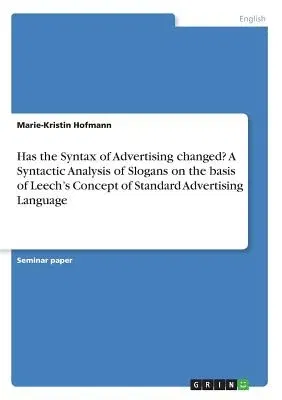Seminar paper from the year 2014 in the subject English Language and
Literature Studies - Linguistics, grade: 1,3, University of Mannheim
(Anglistische Linguistik (A1)), language: English, abstract: This paper
investigates whether the syntactic features of current advertising
slogans are still congruent with Leech's concept of Standard Advertising
Language (established in 1966) since it is a linguistic framework still
widely accepted among scholars. But more importantly, because it can
provide an answer to a more far-reaching question lying behind the issue
of the applicability of Leech's claims to advertising slogans today: in
the course of almost half a century, has advertising language changed
and does a new syntactic framework need to be established? The syntactic
analysis is based on syntactic features such as sentence force, number
of adjuncts, finiteness of verbs, tense and aspect, voice, type of
co-ordination and number of adjectives. The findings suggest that the
majority of the syntactic features of current advertising slogans are
still congruent with Leech's findings. As a result, the applicability of
Standard Advertising English can be extended to current advertising
slogans. However, certain deviations from Leech's concept have been
detected in the sample and they suggest a significant development:
advertising slogans have changed in certain respects since the 1960s. In
Linguistics, four different types of sentence force can be
distinguished, denoted as "mood" by Leech: declarative, imperative,
interrogative and exclamative. The one occurring most frequently in
Leech's sample is the imperative force: in his sample, "...over one in
four major independent clauses were imperative." However, only very few
imperative clauses are accompanied by a negative form since advertising
aims at inciting actions instead of prohibiting them. The infrequency of
negative forms, thus, represents a general principle of advertising
language. Likewise, interrogative clauses a


